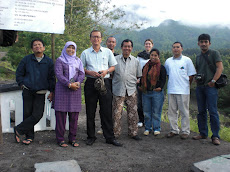 As the ‘country of a thousand islands’, Indonesia is well known to be prone to disaster. So many disasters affect Indonesia: earthquakes, landslides, floods, volcano eruptions, tsunamis and so on. The disasters have caused so many losses, both of lives and material resources.
As the ‘country of a thousand islands’, Indonesia is well known to be prone to disaster. So many disasters affect Indonesia: earthquakes, landslides, floods, volcano eruptions, tsunamis and so on. The disasters have caused so many losses, both of lives and material resources.During the rainy season, so many areas are submerged by floods and attacked by landslides. Even in Jakarta, the capital city, floods have left people in misery, often forcing them into emergency camps. This problem has happened every year for as long as we can remember. And experts predict that for the coming years, Indonesia has the potential to be struck again with the full gamut of earthquakes, floods, volcanic eruptions and tsunamis.
As a result of this dismal forecast, the National Agency for Disaster Reduction (BNPB), supported by those NGOs incorporated in National Platform (an agency which HFI helped to create) launched a national action for disaster risk reduction 2010-2012, in Jakarta on 22 February 2010. This launch was covered by national media and attended by government elements and NGOs.
The launching ceremony was opened by the Ministry of National Development, Armida Salfiah Alisjahbana and the speech of the head of National Agency of Disaster Reduction, Syamsul Ma’arif.
The National Plan for Disaster Risk Reduction 2010-2012 is a national program – a legal foundation for institutionalizing DRR in to local and national government. The program will engage both society and business actors by building coordination rules in implementing DRR at local and national level.
This is such an important step for recovery and risk reduction in Indonesia. With good planning and cooperation, we can look forward to a more stable future.


